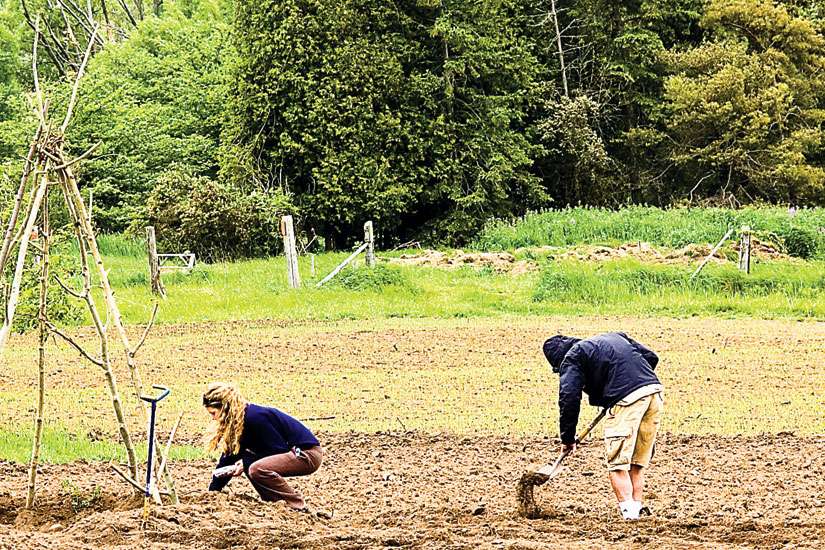“I thought this land can produce food for hungry people in Africa,” said Kraemer.
Fifty years on, that’s exactly what it’s doing.
Since Kraemer’s mother passed away in 1998, a small section of the Kraemer family farm — at first eight hectares and now just four — has been growing food for Canadian Foodgrains Bank. Over 15 years, the little rotating plot of wheat, corn or soybeans has consistently attracted about $40,000 a year in private donations. With sales of the crop and a small amount of government funding, the Kraemer Foodgrains growing project has raised close to $3 million so far.
The teenaged Kraemer who dreamed of Africa while he worked on the family farm actually went off to university and put in a long career teaching religion in Catholic schools, including 25 years at Sacred Heart in Walkerton.
Over the years the Kraemers had gone from farming their land to renting it out to other farmers who pastured cows and grew feed. But when Kraemer’s mother was dying it was time to make some decisions about the family farm. Kraemer had heard about Canadian Foodgrains Bank and asked his mother about it.
“She said, ‘That would be excellent. I would like that,’ ” said Kraemer.
The rent the Kraemers were collecting to pasture cows on that bit of land was negligible. In those days, Kraemer was still teaching and the Foodgrains growing project gave him a chance to use the farm as a kind of outdoor classroom where he could concretely demonstrate what the Church teaches about social justice.
He brought students out to plant pumpkin seeds in the spring and then brought them back in the fall to harvest pumpkins. Kraemer and the kids sold the Halloween-ready pumpkins from his front yard in downtown Walkerton, then sent the money to Foodgrains in Winnipeg.
The first crop of corn the Kraemers grew for Foodgrains was actually shipped directly to hungry people in Africa, through Port Elizabeth, South Africa, and onto Mozambique. In the interest of more effectively feeding more people, Foodgrains no longer ships food but sells food and ships money.
“We found it’s more efficient, it’s more effective, it’s a more long-term, sustainable process to try to get money to a group you are in touch with — an NGO in the country — than to try to ship boatloads of stuff from here to there and through all the complications,” Kraemer said.
It’s not just a matter of making sure Foodgrains food doesn’t end up on the black market or rotting on a loading dock. When money goes to help African, Asian or Latin American farmers produce more and better food themselves, developing world rural communities are sustained and made more resilient. Farmers who have had Foodgrains support and training gain the tools to feed their own families and communities.
The Kraemers’ growing project in Walkerton is one of 256 that were active last year, ranging from as much as 200 hectares of wheat in Morden, Man., to a garden plot of just over half a hectare cared for by parishioners at St. Theresa’s Roman Catholic Church and St. Anthony of Padua parish in Winnipeg on the property of the Benedictine Sisters.
The Winnipeg garden plot sold $3,350 worth of vegetables last year and donated nearly 1,200 kilograms of fresh vegetables to a local food bank.
In the 2013-14 fiscal year, growing projects contributed $6.6 million to Canadian Foodgrains Bank — 56 per cent of $11.8 million in charitable giving to the ecumenical aid group.
Over the years Kraemer has deepened his commitment to Foodgrains. He visited Malawi in 2002 and Sierra Leone in January on Canadian Foodgrains Bank food-study tours, meeting with farmers and local agricultural organizations.
“Those experiences have confirmed to me that what (Foodgrains) say they’re doing over here is actually being done over there,” Kraemer said. “To me, the Canadian Foodgrains Bank is a very authentic organization in the sense that they have something in the neighbourhood of 95-per-cent efficiency, in the sense that the money does get to where it is required.”
Working with 15 Canadian churches and church agencies, including the Canadian Catholic Organization for Development and Peace, Foodgrains reached 1.3 million people last year in 42 different countries.


